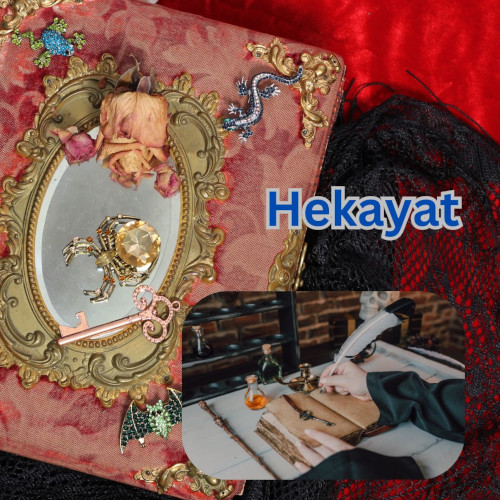Hekayat 1 from Chapter 6 of Golestan of Saadi Shirazi

English Translation for Hekayat
I was engaged in a discussion with a group of scholars in the grand mosque of Damascus, when a young man entered and asked: "Is there anyone here who knows Persian?"
Most of them pointed towards me.
I said, "What is the matter?"
He replied, "An old man, a hundred and fifty years of age, is on his deathbed, and he is saying something in Persian that we do not understand. If you would kindly assist, you might be rewarded, as he seems to be making a will."
When I reached his bedside, I heard him saying:
"I thought I could take a few more breaths as I pleased,
Alas! The way to my breath has been blocked.
Alas! At the banquet of life’s colorful table,
We had just begun to eat when they said, 'Enough!'"
I translated the meaning of his words into Arabic for the people of Damascus, who marveled at his long life and his ongoing regret for the pleasures of this world.
I asked him, "How are you feeling in this state?"
He replied, "What can I say?"
"Have you not seen the pain that comes to someone
When they are forced to lose a tooth from their mouth?
Imagine what it will be like at that moment
When one’s precious soul is taken away."
I said, "Drive away the fear of death from your mind and do not let your imagination dominate your nature. The philosophers of Greece have said: even if one’s temperament is balanced, there is no guarantee of life, and though a disease may be severe, it does not necessarily indicate certain death. If you wish, I can summon a doctor to treat you."
He opened his eyes, smiled, and said:
"The clever doctor claps his hands in defeat
When he sees his patient lying like a helpless old sheep.
The master is concerned with decorating the façade of the mansion,
While the foundation of the house is crumbling.
An old man was groaning in the throes of death,
While an old woman was rubbing sandalwood on his feet.
When the balance of temperament is disturbed,
Neither remedies nor treatments will have any effect."
متن حکایت
با طایفه دانشمندان در جامع دمشق بحثی همیکردم که جوانی در آمد و گفت: در این میان کسی هست که زبان پارسی بداند؟
غالب اشارت به من کردند.
گفتمش: خیر است!
گفت: پیری صد و پنجاه ساله در حالت نزع است و به زبان عجم چیزی همیگوید و مفهوم ما نمیگردد. گر به کرم رنجه شوی مزد یابی، باشد که وصیتی همیکند.
چون به بالینش فراز شدم این میگفت:
دمی چند گفتم بر آرم به کام
دریغا که بگرفت راه نفس
دریغا که بر خوان الوان عمر
دمی خورده بودیم و گفتند بس
معانی این سخن را به عربی با شامیان همیگفتم و تعجب همیکردند از عمر دراز و تأسف او همچنان بر حیات دنیا.
گفتم: چگونهای در این حالت؟
گفت: چه گویم؟،
ندیدهای که چه سختی همیرسد به کسی
که از دهانش به در می کنند دندانی
قیاس کن که چه حالت بود در آن ساعت
که از وجود عزیزش به در رود جانی
گفتم: تصور مرگ از خیال خود به در کن و وهم را بر طبیعت مستولی مگردان که فیلسوفان یونان گفتهاند مزاج ار چه مستقیم بود، اعتماد بقا را نشاید و مرض گرچه هایل، دلالت کلی بر هلاک نکند. اگر فرمایی طبیبی را بخوانم تا معالجت کند.
دیده بر کرد و بخندید و گفت:
دست بر هم زند طبیب ظریف
چون خرف بیند اوفتاده حریف
خواجه در بند نقش ایوان است
خانه از پایبند ویران است
پیرمردی ز نزع می نالید
پیرزن صندلش همی مالید
چون مخبط شد اعتدال مزاج
نه عزیمت اثر کند نه علاج


